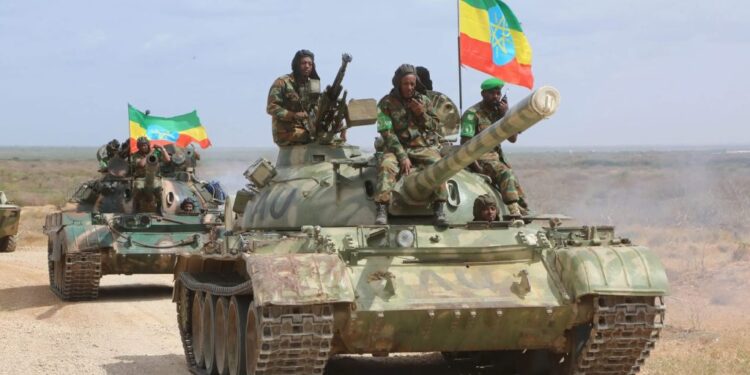MOGADISHU (Somaliguardian) – In June of this 12 months, Somalia’s authorities introduced that Ethiopian troops could be required to depart by December 31, marking the expiration of their mandate. The federal government additional emphasised that any Ethiopian forces remaining past this deadline could be deemed occupiers. With the deadline now handed, many are questioning: Do Ethiopian forces now qualify as occupiers?
Nationwide Safety Advisor Hussein Sheikh Ali has constantly affirmed that Ethiopia will now not keep a navy presence in Somalia nor take part within the newly established African Union Help and Stabilization Mission in Somalia (AUSSOM), set to start in January 2025, until it first retracts the controversial sea entry settlement with the breakaway area of Somaliland.
Ethiopia has but to annul the January settlement, which leased land alongside the Pink Sea from Somaliland for the development of a naval base, a transfer that Mogadishu views as a direct violation of its sovereignty and territorial integrity. Regardless of the passing of the December 31 deadline, Ethiopian forces stay stationed at dozens of navy bases throughout Somalia.
Final month, Somalia and Ethiopia reached a preliminary settlement in Turkey, although the settlement was hurriedly crafted and marred by ambiguities. The 2 nations agreed to resolve their year-long diplomatic dispute and proceed discussions relating to Ethiopia’s entry to Somali waters for business functions. Nevertheless, the accord didn’t embody a provision requiring Addis Ababa to reverse its cope with Somaliland.
Within the ultimate weeks of 2024, Somali officers expressed rising uncertainty over the standing of Ethiopian troops, because the mandate of the African Union Transition Mission in Somalia (ATMIS) neared its December 31 expiration. Critics argue that this disaster resulted from poor planning and a international coverage missing clear course, with the federal government solely confronting the difficulty when the deadline was imminent.
A Somali diplomat knowledgeable the UN Safety Council final week that Ethiopian troops wouldn’t be assigned roles in AUSSOM, as all quotas had already been allotted to different troop-contributing international locations. Nevertheless, the Nationwide Safety Advisor and the State Minister of International Affairs later clarified that discussions have been ongoing relating to Ethiopia’s potential participation within the peacekeeping mission, and no ultimate choices had been made relating to troop contributions.
For a lot of, this example underscores the division throughout the Somali authorities over whether or not Ethiopian troops ought to stay. The guarantees made earlier are considered by critics as an try and distract the Somali public from the federal government’s failure to compel Ethiopia to retract its controversial cope with Somaliland. This, they argue, displays the federal government’s broader incapacity to say Somalia’s pursuits and defend its sovereignty, particularly in opposition to Ethiopia, which is commonly accused of manipulating Somali leaders to serve its personal pursuits—an agenda extensively believed to have undermined Somalia’s peace and prosperity.
The current settlement signed in Ankara, which got here regardless of Mogadishu’s year-long stance of refusing dialogue with Addis Ababa until the Somaliland deal was rescinded, has left many Somalis disillusioned and confronted with an uncomfortable actuality. It additionally means that the promise to stress Ethiopia into withdrawing its forces could, like others earlier than it, lead to unfulfilled expectations.
Mogadishu’s international coverage appears more and more difficult, because it navigates a number of agendas. The federal government seeks Ethiopia’s help in eradicating Jubaland President Ahmed Madobe, who enjoys backing from Abiy Ahmed, whereas concurrently counting on deployment of Egyptian contingents to assist President Hassan Sheikh Mohamud keep energy amid potential opposition. On the identical time, Mogadishu is working to appease Eritrea, which continues to help the Somali Nationwide Military, all whereas guaranteeing the stream of Western donor funds which are cautious of Egyptian or Eritrean forces becoming a member of AUSSOM.
In conclusion, Ethiopian troops are more likely to stay in Somalia longer than anticipated. Addis Ababa has reiterated that its forces, which have crossed Somali borders for over three a long time, didn’t come to advertise peace however to safeguard Ethiopian pursuits. Whereas most Somalis view Ethiopian forces as invaders, solely a small group of elite politicians has legitimized their presence. Whether or not Mogadishu will formally acknowledge them as occupiers stays unsure, although this appears unlikely, given the worry that Ethiopia has instilled in Somalia’s political elite, lots of whom owe their present standing to Ethiopian help.
Contact us: information@somaliguardian.com










 Lake To Reopen + Twins Lose 5 In A Row + Vikings Launch Cook dinner
Lake To Reopen + Twins Lose 5 In A Row + Vikings Launch Cook dinner